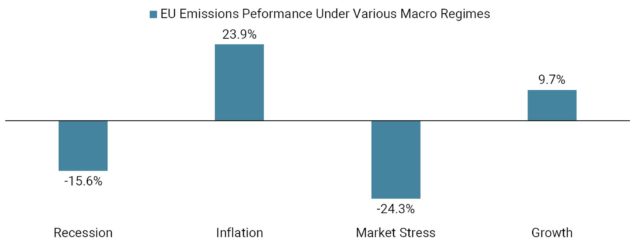
Source: Unigestion, Bloomberg as of 17 November 2021.
Macroeconomic conditions are one of the key drivers of the carbon market. We examined the average performance of carbon across four macro regimes: recession, inflation surprise, market stress and steady growth. As can be seen from today’s chart, carbon performs best during inflation and growth regimes.
Indeed, strong economic growth dynamics imply a rise in demand for goods and services and the resulting manufacturing activity leads to higher emissions and thus a higher demand for emissions. The strong economic recovery post the Covid crisis is a significant factor behind the current rally in the price of carbon.
The risk of inflation surprise is the most supportive regime for carbon and the strong inflationary pressures in commodity and energy prices over the last year have led to an increase in the use of coal, pushing the green energy transition further away. The notorious by-product of burning coal is CO2, making it one of the most polluting sources of energy. Increased coal burning therefore automatically increases the demand for carbon. A potentially cold winter and the resulting demand for heating could act as a further catalyst for carbon.
Our proprietary Inflation Nowcasters and Newscasters are both pointing towards an elevated inflation surprise risk and show no signs of abating. It looks like the carbon rally therefore has further to run.
Important Information
The information and data presented in this page may discuss general market activity or industry trends but is not intended to be relied upon as a forecast, research or investment advice. It is not a financial promotion and represents no offer, solicitation or recommendation of any kind, to invest in the strategies or in the investment vehicles it refers to. Some of the investment strategies described or alluded to herein may be construed as high risk and not readily realisable investments, which may experience substantial and sudden losses including total loss of investment.
The investment views, economic and market opinions or analysis expressed in this page present Unigestion’s judgement as at the date of publication without regard to the date on which you may access the information. There is no guarantee that these views and opinions expressed will be correct nor do they purport to be a complete description of the securities, markets and developments referred to in it. All information provided here is subject to change without notice. To the extent that this page contains statements about the future, such statements are forward-looking and subject to a number of risks and uncertainties, including, but not limited to, the impact of competitive products, market acceptance risks and other risks.
Data and graphical information herein are for information only and may have been derived from third party sources. Although we believe that the information obtained from public and third party sources to be reliable, we have not independently verified it and we therefore cannot guarantee its accuracy or completeness. As a result, no representation or warranty, expressed or implied, is or will be made by Unigestion in this respect and no responsibility or liability is or will be accepted. Unless otherwise stated, source is Unigestion.
Past performance is not a guide to future performance. All investments contain risks, including total loss for the investor.
